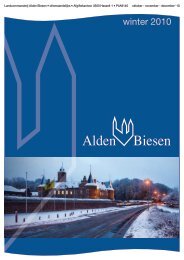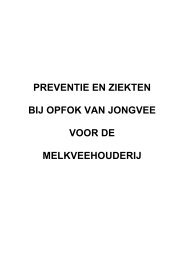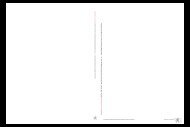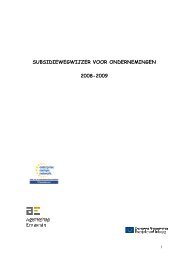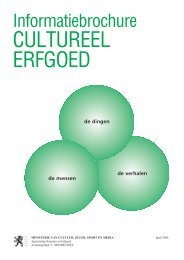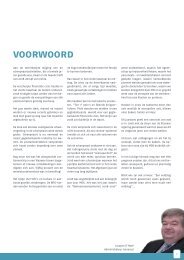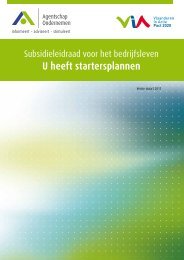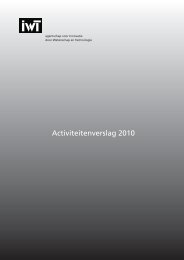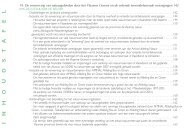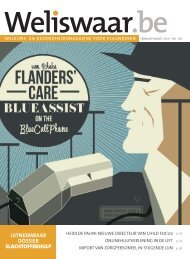Acknowledgements Book of abstracts - Publicaties - Vlaanderen.be
Acknowledgements Book of abstracts - Publicaties - Vlaanderen.be
Acknowledgements Book of abstracts - Publicaties - Vlaanderen.be
Create successful ePaper yourself
Turn your PDF publications into a flip-book with our unique Google optimized e-Paper software.
Lesley Wiseman-Orr presents Poster 37 during the poster sessions in the Aula.<br />
Session theme 4: Assessing health status <strong>of</strong> groups <strong>of</strong> animals in relation to welfare<br />
109<br />
Poster 37<br />
THE DEVELOPMENT OF A HEALTH-RELATED QUALITY OF LIFE<br />
INSTRUMENT FOR USE WITH FARMED PIGS<br />
M.L. Wiseman-Orr 1 , E.M. Scott 1 , A.M. Nolan 2 , D.A. Sandercock 2<br />
1 Department <strong>of</strong> Statistics, University <strong>of</strong> Glasgow, Glasgow, UK<br />
2 Department <strong>of</strong> Veterinary Clinical Studies, University <strong>of</strong> Glasgow, Glasgow, UK<br />
Modern pig farming methods such as tail docking and mixing <strong>of</strong> ‘unfamiliars’ may have health and<br />
quality <strong>of</strong> life (QOL) consequences for adult pigs. A project was undertaken to investigate such<br />
impacts, with the development <strong>of</strong> a suitable QOL measurement tool. At the outset, it was necessary<br />
to define the construct to <strong>be</strong> measured in the context <strong>of</strong> groups <strong>of</strong> animals.<br />
The contemporary focus in QOL measurement for people and animals is on individuals’ experience<br />
<strong>of</strong> their circumstances. However, objective indicators <strong>of</strong> those circumstances are also important, in<br />
order that habituation to poorer environments does not mitigate poorer provision. Objective<br />
indicators for QOL in farmed animals are framed in the ‘five freedoms’ and detailed in relevant<br />
animal welfare legislation that provides criteria against which provision can <strong>be</strong> measured. However,<br />
for the valid measurement <strong>of</strong> QOL it is essential also to identify appropriate subjective indicators<br />
that capture the individual’s experience. Scores on both then compose the measured QOL for an<br />
individual. Where standard husbandry practices are applied to a group <strong>of</strong> phenotypically similar<br />
individuals, limited variability in QOL should result. However, illness or injury may have a<br />
significant impact, so the term health-related quality <strong>of</strong> life, (HRQL) is appropriate, where objective<br />
indicators include health status.<br />
Consequently, we define the construct to <strong>be</strong> measured - HRQL <strong>of</strong> farmed pigs - as a combination <strong>of</strong><br />
the individual’s circumstances, which include health status, and its affective response to those<br />
circumstances; group-level measurement is achieved by the distribution <strong>of</strong> HRQL scores for<br />
individuals in that group.<br />
A psychometric approach to instrument development was taken, with interviews conducted with<br />
experienced farmers and stockpersons (1 female, 20 male). Analysis provided details <strong>of</strong> relevant<br />
observations, and descriptions <strong>of</strong> potential subjective indicators <strong>of</strong> HRQL, including <strong>be</strong>haviour<br />
relating to appetite, activity, social interaction with pigs and stockpersons, playfulness and<br />
demeanour.<br />
Contact information: Lesley Wiseman-Orr or email l.wiseman@stats.gla.ac.uk<br />
Complete address: Department <strong>of</strong> Statistics, Mathematics Building, University Garden,s University<br />
<strong>of</strong> Glasgow, Glasgow G12 8QW, UK<br />
Species: Pig



